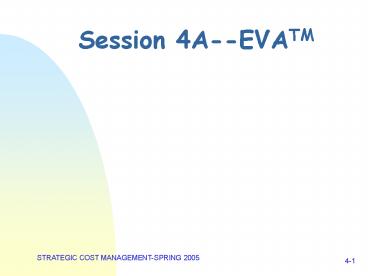Session 4A--EVATM - PowerPoint PPT Presentation
1 / 24
Title:
Session 4A--EVATM
Description:
Popularized in Fortune Magazine. Alternative methods of computation. Horngren. Stern-Stewart ... Focuses on life cycle costing. STRATEGIC COST MANAGEMENT-SPRING ... – PowerPoint PPT presentation
Number of Views:23
Avg rating:3.0/5.0
Title: Session 4A--EVATM
1
Session 4A--EVATM
2
Economic Value-added Analysis
- Brainchild of Stern-Stewart
- Popularized in Fortune Magazine
- Alternative methods of computation
- Horngren
- Stern-Stewart
- Excellent as an internal measure
- Hints for implementation
3
Lets Define EVA
When the Cost of Capital is less than the
Operating Income from that Capital, you create
EVA!!!
4
EVA Elements
- Cost of Debt Financing
- Cost of Equity Financing
- Components of Capital
- Adjusted Net Operating Income
5
Cost of Debt Financing
- Interest Expense
- After-tax Impact
- Consider all Debt, Excluding A/P
6
Cost of Equity Financing
- Shareholder Hurdle Rate
- Price Appreciation
- Dividend Rate
- Six Percentage Point Rule
7
Components of Capital
- Net Working Capital
- Net Long-lived Tangible Assets
- R D Spending
- Employee Development Spending
8
Adjusted Net Operating Income
- Substitute RD and Employee Development Costs
with Annual Amort. - Use Net Income from Continuing Operations
- Adj. Net Op. Income Minus Cost of Financing
Equals Economic Value Added
9
EVA Uses
- Planning Tool
- Business Unit Evaluation
- Incentive Compensation Base
- Merger and Acquisition Analysis
- Capital Asset Analysis
10
Corporate Examples
- CSX
- Quaker Oats
11
Ways to Raise EVA
- Increase Profits
- Reduce Capital Spending
- Reduce Investment in Working Capital
- Increase High-margin Capital Investments
12
Stern Stewarts Implementation Hints
- Top management buy-in
- Make it a way of life
- Implement Gradually
- Keep it Simple
- Train the users
13
Session 4B--Target Costing
14
Life Cycle Costing
Product SpecificationTarget PriceTarget
ProfitTarget CostMajor Product and Process
Design ChangesDoes the designmeet target
cost?Estimate LifeCycle CostIs project life
cycle cost acceptable?Put product into
productionMinor Product and Process Design
ChangesProduct Abandonment
TargetCosting KaizenCosting Abandonment
15
Product Cost Life Cycle
- R D
- Design
- Production
- Marketing Distribution
- Customer Service
Upstream
Downstream
16
Shift in Strategic Impact
- Shift focus from manufacturing costing to
- Upstream or downstream focus using the value chain
17
Target Costing
- Customer Orientation
- Sets costs in the commitment phase-concurrent
engineering - Supports keiretsu model via the value chain
- Price led costing
- Cross functional product teams
- Focuses on life cycle costing
18
Target Costing Process
- Establishment phase
- Market research
- Competitor analysis
- Niche definition
- Customer requirement definition
- Product feature definition
- Market price determination
- Profit rate
19
Target Costing Process
- Attainment phase
- Cost gap computation
- Design costs out
- Design release and continuous improvement
20
Cost Reduction
- Cost analysis
- Components list
- Functional analysis
- Customer requirement ranking
- QFD Matrix
- Relative functional rankings
- Value engineering
- Identify components for cost reduction
- Generate cost reduction ideas
- Testing and implementation
- Cost estimates required at each design iteration
21
Value-Index Analysis
- Choose features and options based upon customer
preference - Value-Index Cust. Preference Feature
Cost - VI gt 1increase spending
- VI lt 1decrease spending
22
TC-Strategic Implications
- Quality is improved through the customer focus of
target costing - Cost reduction is the heart of target costing
- Time reduction is a natural by-product due to
concurrent engineering
23
TC-Attribute Implications
- Technical
- Decision relevance improves (quality, cost and
time issues are integrated) - Process understanding improves
- Behavioral
- Early finance involvement and teamwork are
mandated - Undesirable attributes of longer development,
burnout, feature creep internal conflict can be
managed
24
TC-Attribute Implications, cont.
- Cultural
- Organizational culture must be prepared
- Commitment to sustaining values must be
established - Customer focus
- Cross-functional cooperation
- Open sharing of information































